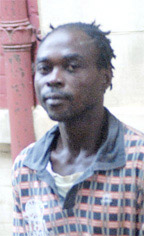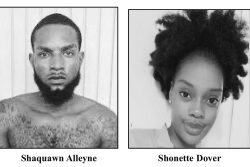Deeming a 47-year sentence imposed by Justice Navindra Singh against a man who had pleaded guilty to the unlawful killing of two Charlestown residents back in 2010 as being excessive, the Guyana Court of Appeal yesterday reduced the sentence to 26 years.
Appealing the sentence was William Lyte, whom the judge had jailed for 21 and 26 years respectively for the October 26th, 2010 killings of Ann Cham-A-Koon and Cedric Blackman.
Justice Singh had noted at the time of sentencing that the extra years imposed upon Lyte for Blackman’s killing, was because he was a relative of the dead man who had also been kind to him.

Though originally indicted with capital charges, Lyte pleaded to the lesser offence of manslaughter on March 20th, 2014.
Following the presentation of a probation report, Justice Singh handed down the sentences, which he ordered to be served consecutively.
It was this order which formed the thrust of Lyte’s appeal, which his attorney Mark Conway argued was excessive and could not be justified.
Referencing a number of case law authorities, Chancellor Yonette Cummings-Edwards, as advanced by the defence and conceded by the state, said that given the particular circumstances of the case, the judge ought not to have imposed the sentences to run one after the other.
Citing cases, the chancellor explained that it was in fact the common legal practice for sentences to run concurrently for multiple deaths resulting from the single transaction of the same event.
The chancellor said that the legal authorities all demonstrate that in such circumstances the sentence ought not to be excessive and is to be handed down concurrently, especially she said, since the appellant would have thrown himself at the mercy of the court, accepting responsibility for his actions and pleading to the lesser offence.
Resultantly, the appellate court allowed the appeal and ordered that the sentences be served concurrently—that being 26 years.
Prosecutor Stacy Goodings, in her written submissions to the court, conceded that it was against the principles laid down in case law, for the appellant to have been given consecutive sentences, given the particular circumstances outlined by the court.
Lyte, who after an evaluation by psychiatrist Dr Bhiro Harry was deemed to have been

mentally ill, but found fit at the time to stand tried, had also advanced as a ground of appeal that Justice Singh erred in not taking his mental state into consideration at the time of the offence, as a mitigating factor.
After reducing the sentence and pointing out that the appellant had been deemed fit before pleading to the charges, this ground was not further addressed.
The Court of Appeal did, however, order that the man continue receiving mental evaluation on a quarterly basis or as often as seen fit by the psychiatrist.
On the day in question, the mentally ill Lyte had gone on a chopping rampage on Russell Street, Charlestown which left Blackman and Ann Cham-A-Koon dead and a number of persons nursing chop wounds he also inflicted on them.
According to a probation report presented at his sentencing hearing, Lyte was a victim of mental illness and had been incarcerated several times in the psychiatric ward of the Georgetown Public Hospital.
The report indicated that Lyte would “trip out” when he did not get his way.
Lyte’s appeal was heard by Chancellor Cummings-Edwards and Justices of Appeal Rishi Persaud and Dawn Gregory.








